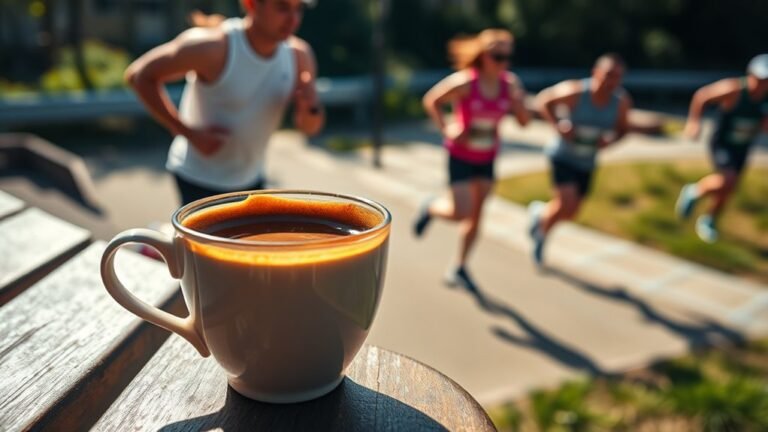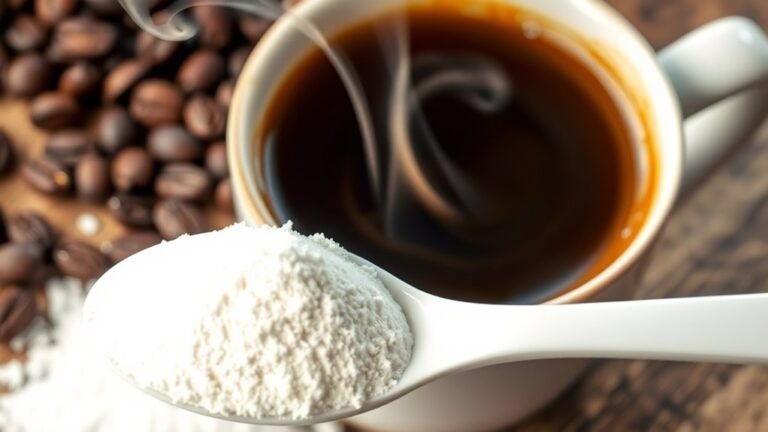The Benefits of Coffee for Team Sports
Coffee boosts your performance in team sports by enhancing endurance, focus, and motivation. It helps lower perceived effort, making workouts feel easier and improving your reaction times. A shared coffee ritual among teammates can elevate team morale and create camaraderie, leading to better communication during games. To optimize these benefits, consider your coffee type and timing before, during, and after training. There’s much more to discover about integrating coffee into your athletic routine.
Enhanced Endurance and Stamina

When it comes to enhancing endurance and stamina in team sports, coffee can be a game-changer. Studies show that caffeine improves physical performance, allowing you to push harder and last longer during games. To maximize its benefits, focus on caffeine timing; consuming coffee about 30-60 minutes before your activity can boost your energy levels effectively. However, don’t forget hydration balance—coffee is a diuretic, so pair it with adequate water intake to prevent dehydration. Maintaining hydration is essential for peak performance, especially in high-intensity sports. By incorporating coffee strategically into your pre-game routine, you can experience improved endurance, helping your team perform at its best while you enjoy the freedom of enhanced physical capabilities.
Improved Focus and Concentration
When you consume coffee before a game, you can experience enhanced mental alertness that helps you stay sharp on the field. Research shows that caffeine can considerably boost your reaction times, allowing you to respond more quickly to plays and opponents. This improved focus can make a big difference in your overall performance during team sports.
Enhanced Mental Alertness
Although many athletes focus on physical training, mental alertness plays an essential role in performance, especially in team sports. Caffeine consumption can considerably enhance your mental clarity, allowing you to stay sharp during critical moments in the game. Research shows that caffeine not only improves focus but also helps with decision-making, which is fundamental when you need to coordinate with your teammates. By consuming coffee before a match, you’re likely to experience heightened awareness and a sharper mindset. This can lead to better communication and collaboration on the field, ultimately affecting your team’s performance. So, consider incorporating coffee into your routine to boost your mental alertness and give your team the advantage it needs to succeed.
Boosted Reaction Times
Caffeine’s ability to enhance reaction times can make a significant difference in the fast-paced environment of team sports. When you time your coffee consumption right, you can experience improved focus and quicker responses during gameplay. Here’s how coffee affects your performance:
- Increased alertness: Caffeine stimulates the central nervous system, keeping you engaged.
- Faster decision-making: A boost in mental clarity helps you make quick choices on the field.
- Heightened coordination: Enhanced muscle response time can improve your overall agility.
- Caffeine tolerance: Regular coffee drinkers may need to adjust their timing to maximize benefits.
Reduced Perceived Effort

Many athletes find that consuming coffee can considerably reduce their perceived effort during team sports. This effect largely stems from caffeine’s ability to enhance endurance and delay fatigue. When you enjoy your coffee before a game, you might notice that the intensity of your workout feels less intimidating. However, it’s essential to be mindful of your caffeine sensitivity, as some people may experience jitters or anxiety. Additionally, maintaining a proper hydration balance is important; coffee can act as a mild diuretic, so be sure to drink water alongside it. By mastering your coffee consumption, you can enjoy the benefits of reduced perceived effort, allowing you to push your limits and perform at your best during team activities.
Faster Reaction Times
When you consume coffee before a game, you might notice faster reaction times, which can be essential in team sports. Caffeine enhances cognitive function and boosts alertness, allowing you to respond more quickly to plays and opponents. This improved mental sharpness can translate into better physical performance on the field.
Enhanced Cognitive Function
While engaging in team sports, you might find that coffee can significantly boost your cognitive function, particularly enhancing your reaction times. Research shows that caffeine can sharpen your mental clarity, allowing you to think and respond faster in high-pressure situations. Here are some cognitive benefits of coffee:
- Improved Focus: Helps you concentrate on game strategies.
- Quicker Decision-Making: Allows for faster assessments of plays and opponent movements.
- Heightened Alertness: Keeps you aware of your surroundings and teammates.
- Better Coordination: Enhances your ability to execute complex maneuvers smoothly.
Increased Alertness Levels
As your alertness levels increase with caffeine consumption, you’ll likely notice a significant improvement in your reaction times during team sports. Caffeine, a well-known stimulant, enhances your focus and quickens your ability to respond to dynamic game situations. Studies show that athletes who consume caffeine before competition often have faster reflexes, giving them a competitive edge. This boost in alertness benefits not only helps you make quicker decisions but also allows for improved coordination with teammates. By integrating caffeine into your pre-game routine, you’re tapping into a natural way to sharpen your senses and heighten your performance. So, if you’re looking to elevate your game and embrace your freedom on the field, consider harnessing the power of caffeine.
Improved Physical Performance
A noticeable enhancement in physical performance can often be attributed to caffeine’s role in boosting faster reaction times during team sports. When you consume the right caffeine dosage, you may find yourself quicker on your feet and more responsive to the game. However, it’s essential to maintain your hydration balance to maximize these benefits. Here are some key points to take into account:
- Caffeine stimulates your central nervous system, improving alertness.
- It can enhance muscle contractions, leading to faster movements.
- Ideal hydration helps prevent the jitteriness that caffeine might cause.
- Timing your caffeine intake can further elevate performance.
Increased Motivation and Team Morale
When players consume coffee before a game, they often experience a boost in motivation and team morale. The caffeine in coffee not only enhances alertness but also fosters a sense of camaraderie among teammates. This caffeine camaraderie can lead to improved team bonding as players share a ritual that aligns their focus and energy. When everyone’s on the same caffeine boost, it creates a unified atmosphere, encouraging communication and collaboration. Studies have shown that motivated teams perform better, as a positive mindset can enhance overall performance. So, if you’re looking to elevate your team’s spirit before a big match, consider that cup of coffee—it’s not just a beverage; it’s a catalyst for collective motivation and success.
Better Recovery and Reduced Muscle Soreness

Building on the boost in motivation and team morale that coffee can provide, it’s also worth noting its role in recovery after intense physical activity. Caffeine can aid muscle recovery and help reduce soreness, making it a valuable addition to your post-game routine. Here’s how coffee can benefit you:
Coffee not only boosts motivation but also aids in muscle recovery and reduces soreness after intense physical activity.
- Improves muscle recovery by enhancing glycogen resynthesis.
- Reduces muscle soreness through its anti-inflammatory properties.
- Increases circulation, promoting faster nutrient delivery to tired muscles.
- Boosts endurance, allowing for a more effective recovery session.
Incorporating coffee into your routine can help you bounce back quicker and perform better in your next game. So next time you finish a match, consider that cup of coffee as part of your recovery strategy!
Social Aspects of Coffee in Team Dynamics
While many athletes focus on the physical benefits of coffee, its social aspects can considerably enhance team dynamics. Engaging in coffee culture fosters a sense of belonging among teammates, creating opportunities for informal discussions and shared experiences. When you grab a cup together before or after practice, it strengthens team bonding, helping to break down barriers and improve communication. Studies show that shared rituals, like coffee breaks, can boost morale and camaraderie, leading to improved performance on the field. By embracing coffee as a communal activity, you’re not just enjoying a beverage; you’re cultivating relationships that enhance teamwork and trust. Ultimately, a strong team spirit can translate into better coordination and synergy during competitions.
Customization: Finding the Right Coffee for Athletes

Finding the right coffee for athletes can make a significant difference in performance and recovery. Understanding your coffee preferences and experimenting with various brew methods can help you discover what works best for you. Here are some considerations to guide your selection:
- Caffeine Content: Choose beans with higher caffeine levels for increased energy.
- Flavor Profiles: Opt for lighter roasts for a more acidic taste or darker roasts for a bolder flavor.
- Brew Methods: Try cold brew for smoother sips or French press for a richer experience.
- Timing: Consume coffee before workouts for a boost or after for recovery.
Practical Tips for Incorporating Coffee Into Training
Incorporating coffee into your training regimen can enhance both performance and recovery when done strategically. Start by establishing a consistent coffee preparation routine that aligns with your training schedule. Consider integrating coffee into team rituals, creating a shared experience that boosts morale.
| Timing | Preparation Method |
|---|---|
| Pre-Workout | Brewed coffee |
| Mid-Training | Espresso shots |
| Post-Workout | Cold brew with protein |
| Recovery | Iced coffee smoothie |
| Team Meetings | Coffee brewing sessions |
Experiment with different types and methods to find what works best for you. Remember, moderation is key—aim for 3-6 mg of caffeine per kg of body weight for ideal benefits without jitters.
Frequently Asked Questions
Can Coffee Consumption Lead to Dehydration in Athletes?
You might wonder if coffee consumption can lead to dehydration in athletes. While caffeine is a known diuretic, research shows that moderate coffee hydration doesn’t greatly contribute to dehydration. In fact, the fluid intake from coffee can balance out the diuretic effects. So, when consumed in moderation, coffee can be part of your hydration strategy, supporting your performance without causing excessive fluid loss. Just be mindful of your overall fluid intake during exercise.
What Is the Ideal Timing for Coffee Intake Before a Game?
Ever wondered when’s the best time to sip that cup of coffee before a game? For ideal timing, aim for about 30 to 60 minutes pre-game. This allows your body to absorb the caffeine and maximize its benefits, boosting your focus and energy levels. Just be mindful of your overall caffeine intake, as too much can lead to jitters. So, enjoy that pre-game consumption wisely, and you might find yourself playing at your best!
Are There Any Negative Side Effects of Coffee for Athletes?
When considering coffee, it’s important to recognize potential negative side effects for athletes. If you have caffeine sensitivity, even a small amount can lead to jitters or increased heart rate. Additionally, consuming coffee too late in the day can disrupt your sleep, which is essential for recovery and performance. Balancing your intake is key; you want the benefits without compromising your overall well-being and energy levels during training and competition.
How Much Caffeine Is Safe for Young Athletes?
You might think young athletes need a double espresso to power through their games, but that’s not quite accurate. According to caffeine guidelines, youth athletes should limit their intake to about 1-3 mg per kilogram of body weight. So, if you weigh 50 kg, that’s roughly 50-150 mg of caffeine. It’s essential to remember that moderation is key, as too much caffeine can lead to negative side effects like increased heart rate or anxiety.
Can Decaffeinated Coffee Provide Similar Benefits for Sports?
Decaf coffee can still offer some benefits for sports performance, though it won’t provide the same caffeine boost. If you’re looking for caffeine alternatives, decaf might help with hydration and provide antioxidants, which can support recovery. However, without caffeine’s stimulating effects, you might not experience the same energy or focus during intense activities. It’s important to balance your choices and see what works best for your body and performance goals.






